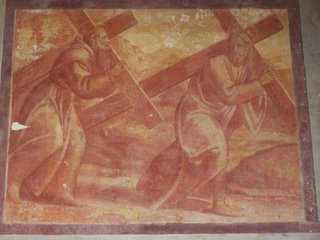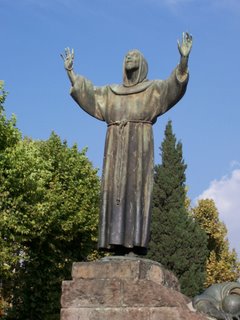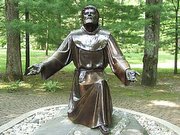Becoming a saint
 In case you thought otherwise, let me tell you that becoming a saint is a real hassle!
In case you thought otherwise, let me tell you that becoming a saint is a real hassle!
I had plans of becoming a saint before I made my First Holy Communion. By the age of 7, I had already decided that I wanted a place in Heaven and that I was going to do whatever I could to get there. Somehow, I was always thwarted. I tried to attend an ordination in the parish (the church was opposite my home) but my father, who was the Master of Ceremonies, told me that I was too little, so I marched up and down the street, singing hymns at the top of my voice in the hopes that someone would hear, realise how desperately I wanted to see what was happening and let me in. They didn't and I quickly bored of my protest. In any case, in those days, I knew very few hymns by heart.
Then my teacher, Miss O'Connell, read us the life of Pope St. Pius X. He apparently used to go to Confession every day, so I thought that might give me a quick entry to Heaven. After less than one week, one of the priests told me that he didn't think I needed to go every day and that perhaps I should let some of the grown-ups have a chance!
Then Miss O'Connell read us the life of Blessed (now Saint) Julie Billiart. Well, I thought that the possibilities of escaping from my pursuers in a hay cart were rather remote, especially as I lived in the city. I liked the idea of a miraculous cure, but I didn't fancy being paralysed for several years and having to hang around for the miracle. Also, I didn't know the Novena to the Sacred Heart, apparently at the end of which Julie was healed.
St. Francis appealed to me, except for his habit of throwing himself into rose bushes and thorns. I've always liked nature and have loved the image of Francis strolling through the woods, using two twigs as a make-believe violin and bow. Francis fasted. So would I. I gave up sweets for about 18 months…until my mother bought me a Mars bar…and if you've never eaten one, then you have no idea of the exquisite luxury of nibbling the chocolate, first from the top, then from the sides and lastly from the bottom of the bar, before tucking into its equally luxurious centre. Since that moment, I've never decided to avoid sweets for the rest of my life. Sugar in tea and coffee was a different matter. The penance of giving it up has been replaced by a complete dislike of the sickly-sweetness of tea or coffee with sugar. Again, sanctity has been thwarted!
Recently, I had the privilege of attending Mass in the Jesuit chapel at La Storta, a most artistically unimpressive wayside chapel not far outside Rome. It was there that St. Ignatius had a vision of Jesus carrying the Cross and that he understood his vocation to be a companion of the suffering Jesus. As I understand it, La Storta was the real beginning of the Society of Jesus.
As I sat in the little chapel, I could 'see' an uncertain Ignatius, perhaps a bit scared, perhaps anxious that he might not be 100% accurate in the way in which he saw the road ahead. It was, maybe, a bit like St. Francis heading off to Rome to ask the Pope for permission to preach penance. Onlookers probably thought they were both idiots! Perhaps they were.
At the end of it all, it seems to me that sanctity is not about certainty in one important sense. Just because someone became a saint, it doesn't mean that he or she had all the answers and that the road ahead was clear, without the normal uncertainties of everybody else's life experience. It seems to me that a fair bit of their road was nothing more than sheer muddling through, doing the best they could with the little that was available to them, the only certainty being that it was all done in the hope of coming closer to God. I reckon that hopeful muddling is the path open to most of us. It sounds inconvenient, but at least it gives me a chance to go to God as I am, not as a poor copy of someone else. That sounds okay. Jesus said that God loves me as I am. That suits me, too. Life quickly proves that I can only be me. I'm not a Pius X, a Julie Billiart, a Francis of Assisi or an Ignatius of Loyola. I am me. I have my own way of coming to know God and it is in my own life that God will make himself known.
God bless,






















